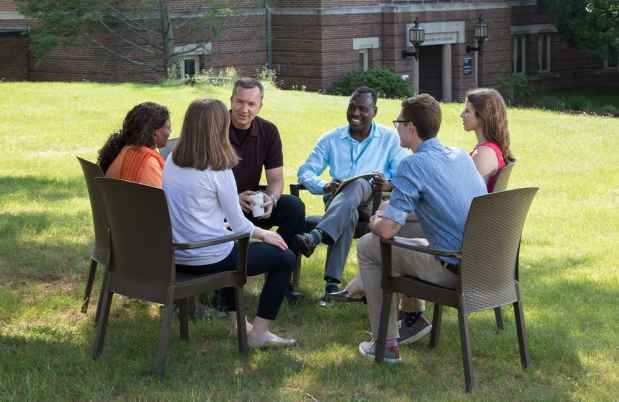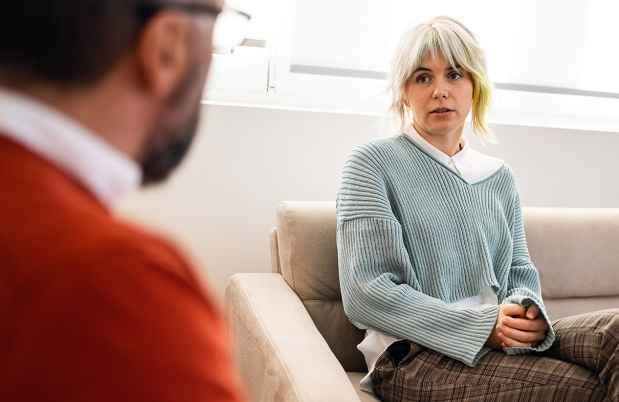When she was in the fourth grade, Alisha Moreland-Capuia, MD, and her classmates were asked by their teacher what they wanted to do when they grew up. Moreland-Capuia had one resounding desire in her mind that would ultimately shape her life’s work: She wanted to help people who were suffering.
Moreland-Capuia jotted down this sentiment in her spiral notebook as an 8-year-old, and turned it into her life’s work, becoming one of the leading trauma-informed care experts in the world.
Through her efforts at McLean Hospital’s Institute for Trauma-Informed Systems Change, which she founded, Moreland-Capuia has trained countless individuals and organizations to utilize trauma-informed care through their decision- and policymaking.
She also harnessed this innate desire to help others into a nonprofit she co-founded called The Capuia Foundation. The mission of the foundation is to help the people of Angola rebuild their country following decades of civil war—a cause of great personal importance to her family.
Now, with the help of a $100,000 grant from McLean, The Capuia Foundation is constructing the Institute for Trauma-Informed Systems Change in Africa in Angola. The project will provide a physical space to deliver this crucially needed training not only to decision-makers throughout Angola, but across the African continent.
“When we began our foundation with the goal of rebuilding the infrastructure in Angola around health care, education, and agriculture, we soon realized that while we can provide resources to improve these services, there remained an untapped need to address the trauma that the people of Angola had experienced,” said Moreland-Capuia.
“How can we meaningfully improve their access to these resources while ignoring this crucial component underlying their mental health and daily lives?”
A Foundation Is Born
Until 2002, Angola experienced nearly 30 years of violent civil war, which began immediately after the country regained independence from Portugal after centuries of colonization. Those cataclysmic events, rife with experiences of violence and oppression, are at the root of the trauma much of the country’s citizens have experienced, and which has shaped their daily lives.
As a medical student, Moreland-Capuia became interested in effects of fear and trauma on the brain and began training under mentors who were leaders in trauma-informed care.
Trauma-informed care is an approach that considers the trauma that an individual may have experienced or still be experiencing, and offers training and education to facilitate healing and empowerment.
While living in Washington DC in the early 2000s, Moreland-Capuia would have frequent discussions with her husband Daniel Capuia, and father-in-law, Estevao Capuia, MSc—both Angola natives who left the country during the 1970s as the war intensified—on what they could do to help the country rebuild following the civil war.
They agreed that agriculture, education, and health care should be priorities for rebuilding, but disagreed on where they should focus their efforts first.

Estevao returned to Angola to conduct a survey on some of the needs for agriculture in the country—an area of expertise of his as an envoy for the United Nations before he had left.
On his visit, a car hit his passenger door as he exited his vehicle resulting in a finger injury that required emergency care. He saw firsthand the challenges facing the country’s inadequate access to health care through his own efforts to get treatment. When he returned to Washington, the three of them agreed to start their efforts by building a clinic.
They opened this clinic in 2015 and that year, The Capuia Foundation was established as a nonprofit where they could fundraise to support this work.
Applying the Tenets of Trauma-Informed Care to Systems
As the foundation embarked upon its efforts, Moreland-Capuia would become a leading expert in trauma-informed care, implementing these practices on a system level through a training paradigm and course she developed. She has also authored two textbooks on her methodology.
Through this work, she has trained organizations ranging from nonprofits to Fortune 500s, health care organizations, educators, government officials, and law enforcement agencies to maximize how they can best serve those impacted by trauma.
It was only natural that Moreland-Capuia would use this expertise to help the people of Angola who have faced significant traumas develop the tools they need to be self-sufficient at rebuilding their country.
As part of her work with Angola, she has conducted two-day workshops at McLean for 54 Angolan leaders and dignitaries with Portuguese translation. She also hosted a group of five Angolan fellows, who spent a year-and-a-half training with her in these approaches.
“By training 54 Angolans including dignitaries from different sectors in Angola, we could make an impact on more than 35 million people,” said Moreland-Capuia. “When people have access to information and knowledge, it’s very powerful and can ultimately support the improvement of the human condition and lift the global community.”
To expand this work, The Capuia Foundation is planning a physical institute in Angola to conduct these trainings. Leaders throughout communities and industries in Angola, as well as those throughout Africa, will be able to take part in these trainings and learn to practice the tenets of trauma-informed care in their respective fields and countries.
The Angolan fellows, who have trained under Moreland-Capuia for the last year and half and will facilitate training in Angola, understand the value this effort will bring.
“I am very proud and honored to be part of such an important and human-driven initiative, which will have a profound impact on the well-being of the Angolan people in particular, and on the continent at large,” said Maria da Cruz, former president and executive director of the U.S.-Angola Chamber of Commerce.
“The work of the institute will provide emotional and physical recovery through its programs and services—healing and providing hope to the country’s most precious resource...its people.”
Added Ana Masseca, an administrator with Ministry of Health in Angola, “Using science to solve problems is just amazing. Angola went through experiences such as colonialism and civil war, important elements that had a negative and profound impact on the country’s development,” she said. “Now we have the opportunity to study these phenomena and improve the quality of life of Angolans.”
This important work of Moreland-Capuia’s closely aligns with McLean’s missions of providing the highest-quality compassionate, specialized, and effective care, and offering public education to facilitate enlightened policy and eliminate stigma.
“The fundamental principle in Dr. Moreland-Capuia’s observation from early in her career is that trauma, threat, and fear, and the neuroscience and biology of these processes, underscores much of mental illness. Her work has shown that untreated trauma is not only important to mental health, it’s important to all system iterations,” said Kerry J. Ressler, MD, PhD, chief scientific officer and the director of the Neurobiology of Fear Laboratory at McLean.
“The work she is doing is inspiring and can affect meaningful change around the world, and McLean is thrilled to support her in this mission.”
Media Requests
Journalist or member of the media? We are available 24/7 for media requests.



